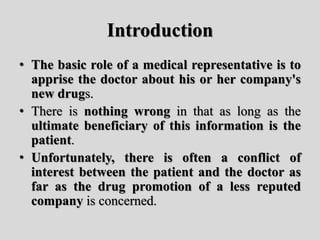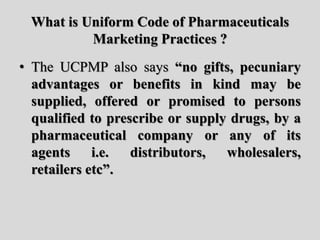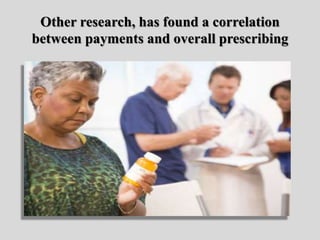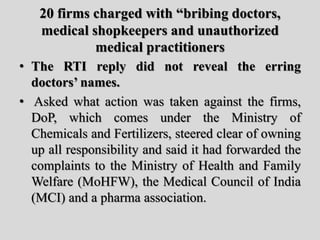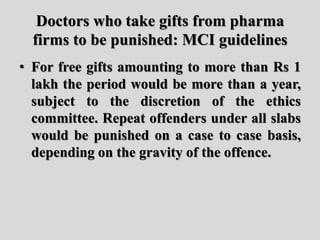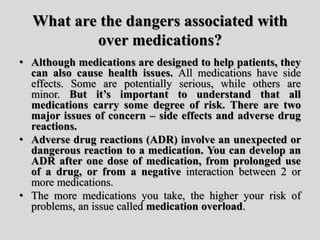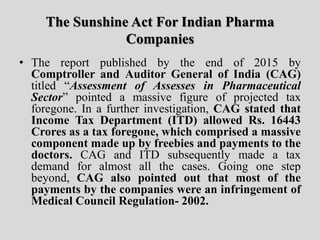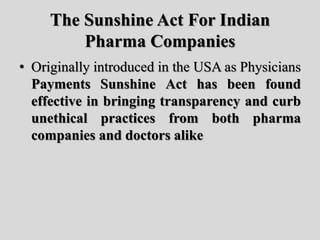The unethical practice of gift giving to doctors by pharma companies
- 1. The Unethical Practice Of Gift-giving to Doctors By Pharma Companies Support For Advocacy And Training To Health Initiatives (SATHI) Report
- 2. The Unethical Practice Of Gift-giving By Pharma Companies
- 3. Introduction • Profit and ethics are both important for the sustainability of a business. • But if we take the case of pharmaceutical companies, it has been observed in some cases that a few of these companies take undue advantage of doctors prescribing and promoting drugs which have no brand and time tested reputation. • Here, we see profits being prioritized over ethics.
- 4. Few of pharma companies take undue advantage of doctors prescribing and promoting drugs which have no brand and time tested reputation
- 5. Introduction • The basic role of a medical representative is to apprise the doctor about his or her company's new drugs. • There is nothing wrong in that as long as the ultimate beneficiary of this information is the patient. • Unfortunately, there is often a conflict of interest between the patient and the doctor as far as the drug promotion of a less reputed company is concerned.
- 6. Basic role of a medical representative is to apprise the doctor about his or her company's new drugs
- 7. Introduction • The interaction of drug companies with doctors in order to promote their medical products through seminars is an acceptable practice in other countries. • But interacting with each doctor individually in public hospitals during their duty time cannot be acceptable. Patients come first, and thus duty time should be reserved for patients.
- 8. Medical representative interacting with each doctor individually in public hospitals during their duty time cannot be acceptable
- 9. Introduction • Drug companies give gifts and other incentives to doctors and other professionals which is a serious breach of code of conduct. • But it is also true that there are ethical doctors who continue to prescribe medicines that are most beneficial and economical to their patients despite being under pressure from medical representatives of drug companies.
- 10. Drug companies give gifts and other incentives to doctors which is a serious breach of code of conduct
- 11. Introduction • There have been news reports that medical representatives give gifts such as pens and writing pads with drug names inscribed. • Some physicians don't consider it unethical to accept gifts like pen stands, calendars, drug samples, company funded lunches or dinners, etc., where a company's products are visibly mentioned, to influence prescribing behavior that is morally wrong.
- 12. medical representatives give gifts such as pens and writing pads with drug names inscribed
- 13. Some physicians don't consider it unethical to accept gifts like pen stands, calendars, drug samples
- 14. Who's paying for lunch?
- 15. Introduction • This 'culture of gifts' is forbidden almost everywhere around the world. • In Bangladesh, Secretaries to the Government or officers of equivalent status may accept gifts offered abroad or within Bangladesh by institutions or official dignitaries of foreign government of comparable or higher levels, provided that the value of the gift in each case does not exceed Tk 500 (USD 6.5) (Rule 5 of Government Servants (Conduct) Rules, 1979).
- 16. In Bangladesh, Secretaries to the Government or officers of equivalent status may accept gifts provided that the value of the gift in each case does not exceed Tk 500 (USD 6.5)
- 17. Introduction • In Australia, any gift or gratuity may be considered a bribe under the law. • The prohibition against bribing public officials can therefore extend to the provision of gifts, travel expenses, meals and entertainment
- 18. In Australia, any gift or gratuity may be considered a bribe under the law.
- 19. Introduction • In China, no specific types of gifts or gratuities are considered permissible under the PRC Criminal Law and, theoretically, gifts which may create conflict of interest constitute a crime.
- 20. In China, no specific types of gifts or gratuities are considered permissible under the PRC Criminal Law
- 21. Introduction • In India, as a general rule, public servants are prohibited from accepting lavish hospitality or frequent hospitality from any individual, industrial or commercial firms, organizations, etc., having or likely to have official dealings with such a public servant.
- 22. In India, as a general rule, public servants are prohibited from accepting lavish hospitality or frequent hospitality from any individual, industrial or commercial firms
- 23. Introduction • In Indonesia, any gift to a public official must first be approved by the government. Any undisclosed gift is deemed as an offence. • In Japan, the Ethics Act has established gifts register and requires middle and senior level public officials to disclose gifts in excess of 5,000 yen (under USD 50)
- 24. In Indonesia, any gift to a public official must first be approved by the government. Any undisclosed gift is deemed as an offence
- 25. Introduction • Japanese statutes do not provide a minimum threshold for a gift. • The Ethics Act and the Ethics Code serve as a reference for the gifts and the public service officials cannot receive any kind of entertainment. • In Malaysia, any limit in relation to gratification, given or received, is an offence of corruption
- 26. Japanese statutes do not provide a minimum threshold for a gift. The Ethics Act and the Ethics Code serve as a reference for the gifts and the public service officials
- 27. Introduction • In the Philippines, Presidential Decree No. 46 makes it punishable for any public officer to receive, directly or indirectly, and for private persons to give, or offer to give, gifts, presents or other valuables to a public officer during any occasion.
- 28. In the Philippines, Presidential Decree No. 46 makes it punishable for any public officer to gifts, presents or other valuables to a public officer
- 29. Introduction • In Singapore, all gifts need to be approved by a permanent secretary and only gifts under SGD 50 (USD 40) can be accepted.
- 30. In Singapore, all gifts need to be approved by a permanent secretary and only gifts under SGD 50 (USD 40) can be accepted
- 31. Introduction • In Vietnam, generally the giving or receiving of gifts and hospitality will be deemed a bribe under Vietnamese law if it satisfies all elements of a bribe.
- 32. Introduction • The real challenge for the medical profession, drug companies and the government is to formulate mutually acceptable guidelines to avoid unethical practices of giving and receiving gifts.
- 33. Government challenge is to formulate mutually acceptable guidelines to avoid unethical practices of giving and receiving gifts
- 34. Introduction • Mushrooming of drug companies is also responsible for this unethical gift practice. Competition between drug companies often compromises the quality of the drug. • If the retail price, quality, and genetic and generic names of drugs are regulated and standardized by the government, this unethical gift practice of some drug companies can be put in check.
- 35. Mushrooming of drug companies is also responsible for this unethical gift practice
- 36. If the retail price, quality, and genetic and generic names of drugs are regulated and standardized by the government, this unethical gift practice of some drug companies can be put in check
- 37. Introduction • Medical Representatives have revealed widespread uses of bribes, including foreign trips, microwave ovens, expensive smart phones, jewellery and even women, by pharmaceutical companies even as government drags its feet on a 2016 proposal to bring in a uniform Code of Pharmaceutical Marketing Practices (UNPMP) in the form of penal provisions.
- 38. Medical Representatives have revealed widespread uses of bribes, including foreign trips, microwave ovens, expensive smart phones, jewellery and even women, by pharmaceutical companies
- 39. Medical Representatives have revealed widespread uses of bribes pharmaceutical companies
- 40. Uniform Code of Pharmaceutical Marketing Practices (UNPMP)
- 41. Introduction • In a report on pharmaceutical marketing practices compiled by a public health group support for Advocacy and training to Health Initiatives (Sathi) medical representatives (MRs) talked of tremendous pressure exerted by companies on them through high sales targets.
- 42. Support For Advocacy And Training To Health Initiatives (Sathi)
- 43. Introduction • Though the code of ethics of the Medical Council of India bars doctors from accepting any gifts, cash, travel facilities or hospitality from pharma companies, there are no law to deal with such corrupt marketing practices. • According to MRs, hardly 10- 20 % doctors follow the MCI code of ethics, while the rest accept or even demand ‘incentives’ to prescribe products of a company. • In many high value deals, such as installments of cars, the company even threatens the doctors if targeted business is not achieved, revealed MRs.
- 44. MCI code of ethics
- 45. Introduction • The report, published by NGO Support for Advocacy and Training to Health (SATHI), suggested that medical representatives bribe doctors with foreign trips, expensive smart phones and even women. • Medical representatives have paid for “purchase of cars, international conferences, online shopping vouchers and even female companionship for doctors”, it stated.
- 46. Introduction • At a review meeting with three drug maker associations — Indian Drug Manufacturers’ Association (IDMA), Indian Pharmaceutical Alliances (IPA) and Organization of Pharmaceutical Producers of India (OPPI) — the government pulled them up for not complying with the Uniform Code of Pharmaceuticals Marketing Practices (UCPMP).
- 47. The report, published by NGO Support for Advocacy and Training to Health (SATHI), suggested that medical representatives bribe doctors
- 48. Introduction • “Drug makers have been warned to follow (Uniform Code of Pharmaceuticals Marketing Practices) UCPMP voluntarily or else the government will be forced to make it a statutory provision under the law. • This will restrict marketing practices of drug makers and affect sales,” said a senior official in the Department of Pharmaceuticals (DoP).
- 49. Drug makers have been warned to follow UCPMP voluntarily or else the government will be forced to make it a statutory provision under the law
- 50. New Rules For Medical Devices Industry • While IDMA, IPA and OPPI are responsible for reporting complaints to the National Pharmaceuticals Pricing Authority (NPPA) every quarter about marketing practices and deviations from UCPMP, not a single compliance report has been received since 2014, officials said.
- 51. While IDMA, IPA and OPPI are responsible for reporting complaints to the National Pharmaceuticals Pricing Authority (NPPA) not a single compliance report has been received since 2014, officials said.
- 52. New Rules For Medical Devices Industry • “The associations told us that they haven’t found any non-compliance in the industry whereas several media reports have highlighted misuse of marketing strategies to lure doctors,” the official quoted earlier said. • The government has also warned drug makers to come up with a rule to revoke manufacturing licenses if any instance of unethical practice is reported. • “The associations have been asked to not force the ministry to take strict action otherwise we will come up with a new law and revoke manufacturing licenses,” the official added.
- 53. What is Uniform Code of Pharmaceuticals Marketing Practices ? • The UCPMP, released in 2014, is a voluntary code issued by the DoP and related to marketing practices for pharmaceutical companies and the medical devices industry.
- 54. What is Uniform Code of Pharmaceuticals Marketing Practices ?
- 55. What is Uniform Code of Pharmaceuticals Marketing Practices ? • The UCPMP also says “no gifts, pecuniary advantages or benefits in kind may be supplied, offered or promised to persons qualified to prescribe or supply drugs, by a pharmaceutical company or any of its agents i.e. distributors, wholesalers, retailers etc”.
- 56. Uniform Code of Pharmaceuticals Marketing Practices
- 57. What is Uniform Code of Pharmaceuticals Marketing Practices ?
- 58. What is Uniform Code of Pharmaceuticals Marketing Practices ? • Not only healthcare professionals, but no gifts should also be extended to a doctor’s family members (both immediate and extended). • It also says “companies or their associations shall not extend any travel facility inside the country or outside including rail, air, ship, cruise tickets, paid vacations, etc. to healthcare professionals and their family members for vacation or for attending press conferences”.
- 59. What is Uniform Code of Pharmaceuticals Marketing Practices ?
- 60. What the SATHI report said • The report by SATHI found that “the ethics and values which were followed in the past are getting bypassed” and “often these codes are not adhered to achieve business”. • It said tactics like an inducement, emotional appeals, persuasions, serving family members, sponsorships for national and promotional and marketing practices of the international conferences, pampering pharma industry and the implementation doctors, etc are used as a norm.
- 61. What the SATHI report said • “Some doctors who give huge business demand women for entertainment and these demands are met,” the study based on the responses of medical representatives (MRs) found. • “Such arrangements are done by a senior level management, and MRs are not directly involved, and is reserved only for the doctors who give enormous business.”
- 62. What the SATHI report said ?
- 63. Doctors Prescribe More of a Drug If They Receive Money from a Pharma Company Tied to It • Pharmaceutical companies have paid doctors billions of dollars for consulting, promotional talks, meals and more. • A new Pro Publica analysis finds doctors who received payments linked to specific drugs prescribed more of those drugs.
- 64. A new Pro Publica analysis finds doctors who received payments linked to specific drugs prescribed more of those drugs
- 65. What is Uniform Code of Pharmaceuticals Marketing Practices • Doctors who receive money from drug makers related to a specific drug prescribe that drug more heavily than doctors without such financial ties, a new ProPublica analysis found. The pattern is consistent for almost all of the most widely prescribed brand-name drugs in Medicare, including drugs that treat diabetes, asthma and more. • The financial interactions include payments for delivering promotional talks, consulting and receiving sponsored meals and travel.
- 66. Doctors who receive money from drug makers related to a specific drug prescribe that drug more heavily than doctors without such financial ties
- 67. What is Uniform Code of Pharmaceuticals Marketing Practices • ProPublica’s analysis found that doctors who received payments wrote 45% more prescriptions for the drug, on average, than doctors who received no payments.
- 68. ProPublica’s analysis found that doctors who received payments wrote 45% more prescriptions for the drug, on average, than doctors who received no payments
- 69. ProPublica’s analysis found that doctors who received payments wrote 45% more prescriptions for the drug, on average, than doctors who received no payments
- 70. What is Uniform Code of Pharmaceuticals Marketing Practices • Other research, has found a correlation between payments and overall prescribing. • This new analysis expands upon past work by looking individually at a variety of popular drugs.
- 71. Other research, has found a correlation between payments and overall prescribing
- 72. What is Uniform Code of Pharmaceuticals Marketing Practices • Our analysis looked at the relationship in two ways: whether those who received payments prescribed more of a drug, as well as whether those who prescribed a drug received higher payments than those who did not. • We found that, on average, physicians who prescribed a drug received higher payments related to the drug that same year than those who didn’t prescribe it
- 73. On Average, Physicians Who Prescribed A Drug Received Higher Payments Related To The Drug That Same Year Than Those Who Didn’t Prescribe It
- 74. There's an unhealthy alliance between doctors and pharma firms • The government has shown little interest to penalize pharma companies that offer sops to doctors to push their drugs • It’s a clear case of self-regulation gone wrong. • That some pharmaceutical companies give expensive gifts, distribute cash and pay for extravagant pleasure trips of doctors willing to push their products, is no news.
- 75. That some pharmaceutical companies give expensive gifts, distribute cash and pay for extravagant pleasure trips of doctors willing to push their products
- 76. There's an unhealthy alliance between doctors and pharma firms • What’s alarming is that there is no law to punish those guilty of the unethical practice; and the government refuses to blink. Result: patients are forced to buy costly medicines.
- 77. patients are forced to buy costly medicines
- 78. There's an unhealthy alliance between doctors and pharma firms • Companies ramp up drug prices to recover the amount spent on promotion. • It was, therefore, no surprise when on January 8, 2019, KC Ramamurthy, Congress MP from Karnataka, demanded in the Rajya Sabha a list of firms accused of bribing doctors and the action taken against them. The government’s response was ambiguous.
- 79. Companies ramp up drug prices to recover the amount spent on promotion
- 80. Companies ramp up drug prices to recover the amount spent on promotion
- 81. KC Ramamurthy, Congress MP from Karnataka, demanded in the Rajya Sabha a list of firms accused of bribing doctors and the action taken against them
- 82. There's an unhealthy alliance between doctors and pharma firms • To seek clear-cut answers, Down To Earth (DTE) filed a Right to Information (RTI) application demanded from DoP, the nodal agency responsible for curbing such malpractices, names of the companies against whom complaints were filed since 2015 and the action taken against them. • In 2015, the government had notified the Uniform Code for Pharmaceutical Marketing Practices (UCPMP), crucial for an industry that until now had nothing to regulate it—neither a law nor any guidelines.
- 83. To seek clear-cut answers, Down To Earth (DTE) filed a Right to Information (RTI) application demanded from DoP, the nodal agency responsible for curbing such malpractices
- 84. There's an unhealthy alliance between doctors and pharma firms • Reply to the RTI, dated February 14, revealed names of 20 firms charged with “bribing doctors, medical shopkeepers and unauthorized medical practitioners to sell their pharmaceutical products” in 2016.
- 85. 20 firms charged with “bribing doctors, medical shopkeepers and unauthorized medical practitioners The firms are: • Eris Life sciences Pvt Ltd, • Merck Ltd, • Glenmark Pharmaceuticals Ltd, • Bayer Healthcare, • Lupin Ltd, • M S D Pharmaceuticals Pvt Ltd, • Cryobanks International India Pvt Ltd, • Sanofi India Ltd, • Sun Pharmaceuticals Industries, • Life Cell International Private Ltd, • U S V Private Ltd,
- 86. 20 firms charged with “bribing doctors, medical shopkeepers and unauthorized medical practitioners
- 87. 20 firms charged with “bribing doctors, medical shopkeepers and unauthorized medical practitioners • Torrent Pharma, • Cordline Sciences India Pvt Ltd, • Intas Pharmaceuticals Ltd, • Abbot Healthcare Pvt Ltd, • E-Meditek (TPA) Services Limited, • U S V Private Ltd, • Bristol-Mayers Squibb India Pvt Ltd, • C M R Life sciences Pvt Ltd, • Boehringer Ingelheim and • Mcleods Pharmaceuticals Ltd. • The complaints were made by Jan Swasthya Abhiyan (JSA) and Punjab Medical Council. In 2018, DoP received complaints against Acinta Pharmaceuticals Private Limited
- 88. 20 firms charged with “bribing doctors, medical shopkeepers and unauthorized medical practitioners
- 89. 20 firms charged with “bribing doctors, medical shopkeepers and unauthorized medical practitioners • The RTI reply did not reveal the erring doctors’ names. • Asked what action was taken against the firms, DoP, which comes under the Ministry of Chemicals and Fertilizers, steered clear of owning up all responsibility and said it had forwarded the complaints to the Ministry of Health and Family Welfare (MoHFW), the Medical Council of India (MCI) and a pharma association.
- 90. 20 firms charged with “bribing doctors, medical shopkeepers and unauthorized medical practitioners
- 91. There's an unhealthy alliance between doctors and pharma firms • “Ethical practice can be enforced only through peer pressure. • Legislation is no solution to the malady,” • MCI, however, does have the authority to cancel the license of corrupt doctors. • But it has only doctors in its ethics committee. “MCI has been completely passive on the ethics dimension,” acknowledges the Parliamentary Standing Committee in a report presented in March 2016. • “All over the world, it has been realized that the medical profession tends to protect its own flock.”
- 92. Ethical practice can be enforced only through peer pressure.
- 93. 20 firms charged with “bribing doctors, medical shopkeepers and unauthorized medical practitioners • In the absence of a law, those who feel unprotected are the medical representatives. They get everyday targets to give pre-planned packages to doctors. • “If a doctor avails privileges from a pharma firm, but does not prescribe its drug, the firm catches hold of us,” says Santanu Chatterjee, secretary, Federation of Medical and Sales Representatives’ Associations of India (FRMRAI). • “We are forced to go to the doctor again so that the commitment is fulfilled. If we don’t meet targets and assure profits, our salaries can be withheld. We can be even sacked.”
- 94. In the absence of a law, those who feel unprotected are the medical representatives. They get everyday targets to give pre-planned packages to doctors
- 95. There's an unhealthy alliance between doctors and pharma firms • McKinsey & Company, a US management consulting firm, states the Indian pharmaceuticals market is set to grow from $33 billion, according to India Brand Equity Foundation, to $55 billion by 2020 and become comparable with all developed markets other than the US, Japan and China. • Small wonder, pharma firms completely ignore UCPMP and promote their products as a business. “The drug promoted the most becomes costliest,” says Chatterjee.
- 96. Indian pharmaceuticals market is set to grow from $33 billion, according to India Brand Equity Foundation, to $55 billion by 2020
- 97. There's an unhealthy alliance between doctors and pharma firms • The gifts, however small, influence the physician, states a study conducted in 2013 by Roshni Narendran of the University of Wollongong, Australia, and M Narendranathan of the Kerala Institute of Medical Sciences, Thiruvananthapuram. • When a physician listens to a drug salesperson and accepts gifts from the company, the doctor is under obligation to prescribe that drug, the study states.
- 98. The gifts, however small, influence the physician, states a study conducted in 2013 by Roshni Narendran of the University of Wollongong, Australia, and M Narendranathan of the Kerala Institute of Medical Sciences.
- 99. There's an unhealthy alliance between doctors and pharma firms • An analysis by the Economic Times Intelligence Group shows 10 largest pharma firms had spent six per cent of their total sales between April 2003 and March 2004 on research and development. In contrast, these firms spent 290 per cent more on marketing. • Clearly, self-regulation has failed to police the interactions between the physician and the pharma firms. “We had given an alternate law which made regulatory obligations mandatory and not voluntary. • It clearly gave penal provisions, from a fine of Rs 50,000 to Rs 20 lakhs and imprisonment depending upon the violation. If such measures are not adopted, this sector will never be regulated”.
- 100. 10 largest pharma firms had spent six per cent of their total sales between April 2003 and March 2004 on research and development. In contrast, these firms spent 290 per cent more on marketing
- 101. There's an unhealthy alliance between doctors and pharma firms • Gifts to doctors influence their prescribing patterns. Research has shown, quite unequivocally, that even a small gift, like a pen, can have an influence. • The evidence on this is catalogued in detail on the website www.nofreelunch.org. • The move of the Medical Council of India (MCI) to amend the code of ethics for doctors and incorporate a specific ban on gifts must, therefore, be welcomed.
- 103. There's an unhealthy alliance between doctors and pharma firms • It must be noted that the rule in India is far more stringent than that in other countries such as the United States. • The new rule in India bans all gifts above Rs 1,000 in value. • The recommended minimum punishment for accepting a gift up to a value of Rs 5,000 is censure, and above this value, suspension from the medical register for various periods is prescribed.
- 104. The new rule in India bans all gifts above Rs 1,000 in value
- 105. There's an unhealthy alliance between doctors and pharma firms • The laudable aim of such bans is to prevent the drug and medical device industry from influencing doctors to use inappropriate or expensive (or both) drugs and devices because of the benefits the doctor can receive for such use. • As many commentators have pointed out, in medicine, the doctor decides and the patient pays; hence there is a special need to ensure that decisions are made solely in the interest of the patient.
- 106. The laudable aim of such bans is to prevent the drug and medical device industry from influencing doctors to use inappropriate or expensive (or both) drugs and devices
- 107. In Medicine, The Doctor Decides And The Patient Pays; Hence There Is A Special Need To Ensure That Decisions Are Made Solely In The Interest Of The Patient.
- 108. Drug information in India • Drug Information In India • Good prescribing habits imply the availability of good information about drugs and medical devices. This means that the doctor must be aware, not only of the appropriate usage of drugs but also of the quality of the different suppliers and the prices. • Unfortunately, in India such information is not easy to come by. In the United Kingdom, for example the Joint Formulary Committee publishes the British National Formulary which lists all medicines available in Britain, the indications for their use and their side effects and prices. • Similar publications exist in most of Europe. The European Union has established the European pharmacopoeia and is moving towards harmonization.
- 109. Drug information in India
- 110. Drug information in India • In India, on the contrary, no official and reliable channel of information exists. Except for checking in the Monthly Index of Medical Specialties or the Current Index of Medical Specialties, there is no way for a doctor to know the relative prices of various brands of the same or similar drugs. • Looking at hundreds of formulations from hundreds of companies is no easy task. The initiative of setting up drug information centres in several states has not taken off in a big way.
- 111. Drug information in India
- 112. Quality concerns • Quality concerns • In a situation of poor regulation, the proportion of spurious to authentic drug formulations in India is estimated to range between 10% and 20%, the figure provided by the legitimate pharmaceutical industry in India and quoted by the World Health Organization task force on spurious drugs
- 113. Quality concerns • The medical devices market is no different with a large number of small players many of whom are not compliant with good manufacturing practices. • In 2005, 10 categories of medical devices were declared to be drugs and their manufacture needs approval from the Central License Approval Authority under the Central Drugs Standardization and Control Organization. • In private conversations, manufacturers of these products allege that the licensing authority demands bribes of about Rs 15 lakh to certify the manufacturing unit as quality compliant. It therefore remains uncertain if the company makes quality goods.
- 114. Quality concerns • In critical areas like stents for the heart, and orthopedic implants, it is unclear if these products have been put through the rigorous testing required. • The Central Drugs Standardization and Control Organization is understaffed and poorly run and it is difficult to repose confidence in this institution • They are: poor enforcement of laws, understaffing, failure to establish a National Drug Authority, inadequate testing facilities, lack of drug inspectors, non-existence of a data bank, and non-availability of accurate information.
- 115. The Central Drugs Standardization and Control Organization
- 116. Quality concerns • It is alleged that bribes are a way of life here. Certification by the CDSCO is therefore no guarantee of quality, and doctors must seek other means to be assured of the quality of the drugs that they prescribe. • One of the common tactics that doctors use is to prescribe only the products of multinational companies or large local companies in the belief that these companies need to protect their brand image and therefore will maintain quality. But the products of these companies are rarely the cheapest in the market.
- 117. Credibility gap in the Medical Council of India • There is also the problem of the huge credibility gap in the MCI. • In recent years this statutory body of the government of India has been in the news for its poor regulation of medical education, its failure to play a leadership role in the governance of medical education and practice and several unsavoury allegations against its members.
- 118. Credibility gap in the Medical Council of India
- 119. Credibility gap in the Medical Council of India • The situation has reached such a sorry pass that the government has expressed an intention to abolish it and replace it with another body. • The way the Council is constituted lays it open to the shenanigans of people of little integrity. It is difficult to escape the conclusion that the present amendment to the ethical code is a feeble attempt to lay claim to ethical behavior. • If the Medical Council of India is really serious about setting right the numerous infractions of its ethical code, it needs to do much more than add another rule to a code which is seldom enforced
- 120. Medical Council of India (Code of Conduct) • 6.8.1 In dealing with Pharmaceutical and allied health sector industry, a medical practitioner shall follow and adhere to the stipulations given below:- • a) Gifts: A medical practitioner shall not receive any gift from any pharmaceutical or allied health care industry and their sales people or representatives. • b) Travel facilities: A medical practitioner shall not accept any travel facility inside the country or outside, including rail, air, ship , cruise tickets, paid vacations etc. from any pharmaceutical or allied healthcare industry or their representatives for self and family members for vacation or for attending conferences, seminars, workshops, CME programme etc as a delegate.
- 121. Medical Council of India (Code of Conduct)
- 122. Medical Council of India (Code of Conduct) • c) Hospitality: A medical practitioner shall not accept individually any hospitality like hotel accommodation for self and family members under any pretext. • d) Cash or monetary grants: A medical practitioner shall not receive any cash or monetary grants from any pharmaceutical and allied healthcare industry for individual purpose in individual capacity under any pretext.
- 123. Medical Council of India (Code of Conduct)
- 124. AMA Code of Medical Ethics • Gifts to Physicians from Industry • Any gifts accepted by physicians individually should primarily entail a benefit to patients and should not be of substantial value. • Accordingly, textbooks, modest meals, and other gifts are appropriate if they serve a genuine educational function. • Cash payments should not be accepted. The use of drug samples for personal or family use is permissible as long as these practices do not interfere with patient access to drug samples.
- 125. AMA Code of Medical Ethics
- 126. AMA Code of Medical Ethics • Individual gifts of minimal value are permissible as long as the gifts are related to the physician’s work (e.g., pens and notepads).
- 127. AMA Code of Medical Ethics • Subsidies from industry should not be accepted directly or indirectly to pay for the costs of travel, lodging, or other personal expenses of physicians attending conferences or meetings, nor should subsidies be accepted to compensate for the physicians’ time.
- 128. AMA Code of Medical Ethics
- 129. AMA Code of Medical Ethics • Subsidies for hospitality should not be accepted outside of modest meals or social events held as a part of a conference or meeting. • It is appropriate for faculty at conferences or meetings to accept reasonable honoraria and to accept reimbursement for reasonable travel, lodging, and meal expenses.
- 130. AMA Code of Medical Ethics
- 131. AMA Code of Medical Ethics • No gifts should be accepted if there are strings attached. For example, physicians should not accept gifts given in relation to the physician’s prescribing practices.
- 132. Doctors who take gifts from pharma firms to be punished: MCI guidelines • For the first time, these guidelines will define punishment for errant doctors based on the value of favours or freebies received from pharma companies • Doctors accepting freebies such as gifts and foreign jaunts from pharmaceutical companies will now be punished, based on the value of gifts received. • The punishment will range from a censure for gifts of up to Rs 5,000 to deletion of the errant doctor’s name from the state or national medical register for a period of one year or more for freebies valued more than Rs 1 lakh.
- 133. Doctors who take gifts from pharma firms to be punished: MCI guidelines
- 134. Doctors who take gifts from pharma firms to be punished: MCI guidelines • The Medical Council of India (MCI) is set to notify the new ethical guidelines under the Indian Medical Council (Professional Conduct, Etiquette and Ethics) (Amendment) Regulations, 2015. • For the first time, these guidelines will define punishment for errant doctors based on the value of favours or freebies received from pharma companies. • While the Indian Medical Council Regulations, 2009 bar doctors from receiving freebies, the punishment, if caught, is now subject to the discretion of either the central or the state councils’ ethics committee
- 135. Doctors who take gifts from pharma firms to be punished: MCI guidelines • As per the new ethics guidelines any doctor accepting gifts, travel facilities, hospitality, cash or monetary grants worth Rs 5,000 to Rs 10,000 from a pharma company would see his/her name removed from the national or state medical register for three months. • Nobody can practice medicine without registration with either the state medical council or the central council. If the value of the freebies is between Rs 10,000 and Rs 50,000 the penalty would go up to six months, and for those priced Rs 50,000 to Rs 1 lakh, the errant doctor’s name would remain struck off the register for a year.
- 136. Doctors who take gifts from pharma firms to be punished: MCI guidelines
- 137. Doctors who take gifts from pharma firms to be punished: MCI guidelines • For free gifts amounting to more than Rs 1 lakh the period would be more than a year, subject to the discretion of the ethics committee. Repeat offenders under all slabs would be punished on a case to case basis, depending on the gravity of the offence.
- 138. Doctors who take gifts from pharma firms to be punished: MCI guidelines • An alleged nexus between some pharmaceutical companies and unscrupulous doctors is widely recognized as one of the key reasons behind rising drug prices, although companies maintain that the margins are to account for research and development work. • In reality, cost of the freebies to doctors are usually worked into the marketing cost of drugs. As a result, drugs priced higher containing the same molecules often tend to be the market leaders.
- 139. Doctors who take gifts from pharma firms to be punished: MCI guidelines • The new guidelines lay down that medical practitioners may carry out research work funded by pharma companies, provided they ensure that the research proposals have all the necessary clearances, it fulfills the legal requirements. • Any contravention for the first time will merit a censure but repeat for offenders names would be struck off the medical registers for a period depending on the gravity of the violation.
- 140. Doctors who take gifts from pharma firms to be punished: MCI guidelines • According to norms, a doctor cannot also endorse any medical product unless it is to present the results of an efficacy or other study done in an appropriate scientific body or journal. • Not doing so for the first time would result in a censure; a second offence would mean deletion of his/her name from the medical register.
- 141. According to norms, a doctor cannot also endorse any medical product unless it is to present the results of an efficacy
- 142. Doctors Prescribe Too Many Medications • Medications save lives and make life more bearable for millions of people. No doubt about it. But medications can also cause harm. • Logically, the more medications a patient takes, the higher the risk of side effects and dangerous interactions between medications.
- 143. What are the dangers associated with over medications? • Although medications are designed to help patients, they can also cause health issues. All medications have side effects. Some are potentially serious, while others are minor. But it’s important to understand that all medications carry some degree of risk. There are two major issues of concern – side effects and adverse drug reactions. • Adverse drug reactions (ADR) involve an unexpected or dangerous reaction to a medication. You can develop an ADR after one dose of medication, from prolonged use of a drug, or from a negative interaction between 2 or more medications. • The more medications you take, the higher your risk of problems, an issue called medication overload.
- 144. What are the dangers associated with over medications?
- 145. What is Medication Overload? • What is Medication Overload? • Medication overload is “the use of multiple medications for which the harm to the patient outweighs the benefit. • There is no strict cutoff for when the number of medications becomes harmful, but the greater number of medications a person is taking, the greater their likelihood of experiencing harm, including serious adverse drug events.”
- 146. What is Medication Overload?
- 147. What is the impact of medication overload? • Health issues from medication overload can range from mild to life threatening. And the economic ramifications are staggering.
- 148. What is the impact of medication overload? • Over the last decade: • There were over 35 million cases of older people seeking medical treatment for adverse drug events. • Medication issues led to 2 million hospital admissions.
- 149. What factors lead to medication overload? • Culture of Prescribing • The culture of prescribing is shifting. • Doctors and patients feel the need to “do something” to improve patient health. Ads for prescription medications encourage patients to seek medications for improved happiness and health. The practice of medicine is fast paced, with doctors often seeing patients in time-limited slots. Additionally, we have adopted a medical approach to normal aging. All these factors have led to a shared expectation among doctors and patients that there is a “pill for every ill.”
- 151. What factors lead to medication overload? • Information & Knowledge Gaps • Doctors and other clinicians, as well as patients, don’t always have the critical information and skills they need to evaluate the circumstances and make informed decisions regarding medications.
- 152. What factors lead to medication overload? • Fragmented Care • There is a widespread lack of communication among a patient’s various doctors and other healthcare providers. As a result, patients can suffer. One common scenario: one doctor writes prescriptions for what seems like a new health condition but is actually a side effect from another medication prescribed by another doctor. This practice, referred to as “prescribing cascade”, can lead to a cycle of debilitating health and even death.
- 153. Fragmented Care
- 154. Terminology • No Free Lunch was a US-based advocacy organization holding that marketing methods employed by drug companies influence the way doctors and other healthcare providers prescribe medications. • The group did outreach to convince physicians to refuse to accept gifts, money, or hospitality from pharmaceutical companies because it claims that these gifts create a conflict of interest for providers. The group also advocated for less involvement of drug companies in medical education and practice in a variety of other ways.
- 155. The Sunshine Act For Indian Pharma Companies • The report published by the end of 2015 by Comptroller and Auditor General of India (CAG) titled “Assessment of Assesses in Pharmaceutical Sector” pointed a massive figure of projected tax foregone. In a further investigation, CAG stated that Income Tax Department (ITD) allowed Rs. 16443 Crores as a tax foregone, which comprised a massive component made up by freebies and payments to the doctors. CAG and ITD subsequently made a tax demand for almost all the cases. Going one step beyond, CAG also pointed out that most of the payments by the companies were an infringement of Medical Council Regulation- 2002.
- 156. Income Tax Department (ITD) allowed Rs. 16443 Crores as a tax foregone, which comprised a massive component made up by freebies and payments to the doctor
- 158. The Sunshine Act For Indian Pharma Companies • The issue was also brought on the radar when a member of Rajya-Sabha wrote to the Minister of Chemicals and Fertilizers (who oversees pharmaceuticals portfolio) accusing 4 major Pharma companies for their payment to doctors. • The member also claimed to have a list of companies and doctors who received these payments and freebies. The headlines are making quite a noise in the national capital as patient advocacy groups, public representatives are pushing for India’s own Sunshine Act.
- 159. The Sunshine Act For Indian Pharma Companies • Originally introduced in the USA as Physicians Payments Sunshine Act has been found effective in bringing transparency and curb unethical practices from both pharma companies and doctors alike
- 160. Sunshine Act • The Sunshine Act requires manufacturers of drugs, medical devices, biological and medical supplies covered by the three federal health care programs Medicare, Medicaid, and State Children's Health Insurance Program (SCHIP) to collect and track all financial relationships with physicians and teaching hospitals and to report these data to the Centers for Medicare and Medicaid Services (CMS).
- 161. Sunshine Act
- 162. Sales growth of therapy drugs due to the corona-virus (COVID-19) across India in March 2020, by type
- 163. References • AMA Code of Medical Ethics’ • https://journalofethics.ama-assn.org/article/ama-code-medical-ethics-opinions-physicians-relationships- drug-companies-and-duty-assist-containing/2014-04 • A physician’s guide to acceptable pharma swag • https://www.mdlinx.com/article/a-physician-s-guide-to-acceptable-pharma-swag/lfc-3715 • Doctors, drug companies, and gifts • https://pubmed.ncbi.nlm.nih.gov/2585690/ • Doctors who take gifts from pharma firms to be punished: MCI guidelines • https://indianexpress.com/article/india/india-news-india/doctors-who-take-gifts-from-pharma-firms-to- be-punished-mci-guidelines/ • Ethical considerations in doctors & pharmaceutical industries relationship: a narrative review • https://ijmdc.com/fulltext/51-1572794591.pdf?1613022855 • Indian Medical Council(Professional Conduct, Etiquette and Ethics) Regulations, 2002 • https://wbconsumers.gov.in/writereaddata/ACT%20&%20RULES/Relevant%20Act%20&%20Rules/Cod e%20of%20Medical%20Ethics%20Regulations.pdf • Support For Advocacy And Training To Health Initiatives (SATHI) Report • https://sathicehat.org/wp-Content/uploads/2019/12/Pharma-study-report_by-SATHI.pdf
- 164. Thanks…





